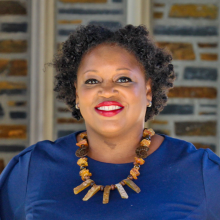Keisha Bentley-Edwards, Ph.D. is an Associate Professor of Medicine in the Division of General Internal Medicine; an Associate Director of Research at the Samuel DuBois Cook Center on Social Equity; and Co-Director at the Center for Equity in Research, CTSI, at Duke University. A developmental psychologist, her research investigates the influence of racism, gender, and culture on the health, education, and well-being of African Americans.
A February 2025 SRCD member spotlight subject and member of the Society's Black Caucus, we asked Dr. Bentley-Edwards to preface her responses to our questions with her perspective on Black History Month.
"Black History Month is a time of celebration of past achievements, but also deep learning and growth. In February and throughout the year, I learn how Black people, including my own family members, navigated and resisted systemic oppression to guide my own path and research. Black History Month reminds us that context matters, and our current state of affairs is rooted in the events, policies, and practices of the past."
How did you choose developmental science as a career?
I stumbled into developmental science. As an undergraduate at Howard University, I took my required research study course with the late Dr. A. Wade Boykin, who was investigating the importance of culturally congruent educational practices for Black children. I also worked with Dr. Hope Hill, engaging with DC Public Schools students on Saturday mornings to support their mental health, racial identity, and academic achievement. I was having a blast and felt that I was doing research that mattered. After completing the year-long course requirement, I joined Dr. Boykin’s research team as a research assistant and asked him, "what kind of psychology are we doing?" That is what started my path as a developmental psychologist. It was the right decision for me.
Is there a mentor or mentors who have been instrumental to your career path so far, and, if so, who and how?
I have been blessed to have had stellar training and mentorship. At UPenn, Dr. Howard Stevenson had me and my classmates evaluating and developing measures while we were also on the ground, engaging with children and their families, meeting with superintendents, and talking to scholarly and community collaborators. His mentorship style allowed me to learn from real-world experiences and to safely learn from my mistakes. I continue to follow his example of community commitment, scholarly rigor, and cultural humility. He still pushes me to dream bigger, and I instill that same energy with my mentees and trainees.
What advice would you give to a prospective graduate student thinking about beginning their Ph.D. studies in the developmental science field?
Start paying attention to the research that excites you. Are you reading the same group of researchers? Take a closer look at those scholars and their institutions. Then make sure that the training being offered fits with your long-term goals, whether it is academia, policy, or nonprofit work. You should feel prepared for your next step.
What is your best SRCD memory?
The Generational Gems series from the Black Caucus was the fellowship I needed as its launch was during the pandemic. It continues to be a program that I look forward to attending. Each time, I leave excited about the field and the work we do for children and families.
Why did you join the Black Caucus? How does being a caucus member benefit you and how does the experience facilitate connection among members?
I was encouraged by my mentors, who were also members, past leadership and/or founders, particularly Drs. Margaret Beale Spencer and Diana Slaughter-Kotzin, and of course, Dr. Stevenson. Being a member of the Black Caucus has provided me with a go-to place to find and offer support, celebrate our collective victories, and share resources like professional development and job opportunities. Mostly, the Black Caucus is a place where my research is understood and uplifted. I am looking forward to my upcoming term as Black Caucus Chair to continue this legacy.
